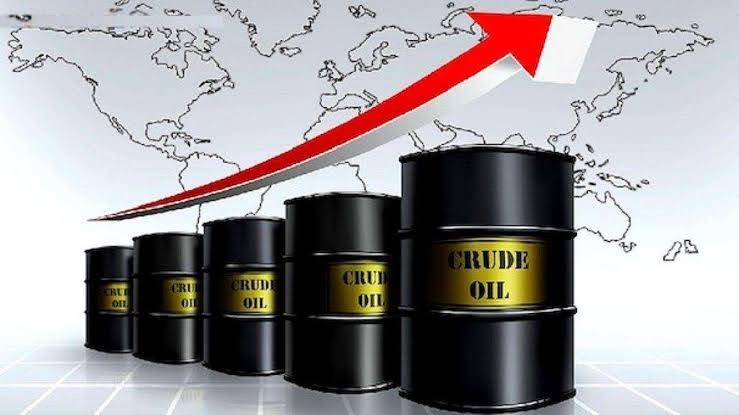Crude Oil Price Crashes, Puts 2025 FG Revenue Target In Jeopardy
The price of Bonny Light, Nigeria's premium oil grade, has dropped by 5.09% to $59.62 per barrel in the global market. This significant decline is attributed to the ongoing trade tensions and tariff hikes announced by the United States, as well as the decision by the Organisation of Petroleum Exporting Countries (OPEC) and its allies to increase oil production by 411,000 barrels per day (bpd) in May 2025.
This development poses a serious challenge to Nigeria's economic management team, as the country's 2025 budget is based on an oil price of $75 per barrel and 2.06 million barrels per day (bpd). The current oil price and output levels are significantly lower than the budgeted figures, indicating a massive setback in terms of revenue and output.
According to the Nigerian Upstream Petroleum Regulatory Commission (NUPRC), the country's oil output, including condensate, stood at 1,671,953 bpd in February 2025. The low oil price and output levels will negatively impact the nation's revenue and foreign exchange earnings, which are crucial for the country's economic stability.
Dr. Muda Yusuf, Chief Executive Officer of the Centre for the Promotion of Private Enterprise (CPPE), expressed concerns about the implications of the low oil price on the economy. "This is a serious problem as we have just completed the first quarter of the year. We have three more quarters to go, meaning that we have serious issues in our hands if the situation persists," he said.
Yusuf noted that the low oil price poses a risk to the country's revenue and exchange rate. "Our economy is dependent on foreign exchange earnings. The low oil price would put pressure on foreign exchange earnings. We all know the implications of a weak exchange rate on the economy," he added.
Despite the negative impact on the economy, the low crude oil prices may lead to a reduction in petroleum products prices in the domestic market. Major players in Nigeria's downstream sector are expected to announce a decrease in the prices of Premium Motor Spirit (PMS), also known as petrol.
The Chairman of the Lagos State Chapter of Petroleum Products Retail Outlet Owners Association of Nigeria (PETROAN), Ehimen Joseph, confirmed that a price reduction is expected. "This should be expected in a deregulated market. If the fall in crude oil prices persists for a while, it would impact developments in the value chain," he said.
OPEC and its allies have decided to increase oil production by 411,000 bpd in May 2025. This decision is expected to impact the global oil market and prices.
In a report, OPEC stated that the eight OPEC+ countries, which previously announced additional voluntary adjustments in April and November 2023, met virtually on April 3, 2025, to review global market conditions and outlook.
The crash in crude oil prices poses significant challenges to Nigeria's economy, particularly in terms of revenue and foreign exchange earnings. While the low oil price may lead to a reduction in petroleum products prices, the country's economic management team must take proactive measures to mitigate the negative impacts and ensure economic stability.
The decision by OPEC and its allies to increase oil production will likely continue to impact the global oil market and prices. As the situation unfolds, it is essential to monitor the developments and assess the implications for Nigeria's economy and the global energy market.
The Nigerian government should take proactive measures to diversify the economy and reduce dependence on oil revenue. The government should also implement policies to stabilize the exchange rate and mitigate the negative impacts of the low oil price.
The country's economic management team should closely monitor the global oil market and adjust the budget and economic plans accordingly.
The low oil price and output levels will have a significant impact on Nigeria's economy, particularly in terms of revenue and foreign exchange earnings. The country's economic stability is crucially dependent on the performance of the oil sector, and the current situation poses significant challenges.
The government must take proactive measures to address the challenges and ensure economic stability. This includes diversifying the economy, stabilizing the exchange rate, and implementing policies to mitigate the negative impacts of the low oil price.
The crash in crude oil prices poses significant challenges to Nigeria's economy. The country's economic management team must take proactive measures to mitigate the negative impacts and ensure economic stability. The decision by OPEC and its allies to increase oil production will likely continue to impact the global oil market and prices. As the situation unfolds, it is essential to monitor the developments and assess the implications for Nigeria's economy and the global energy market.




No comments yet
Be the first to share your thoughts!